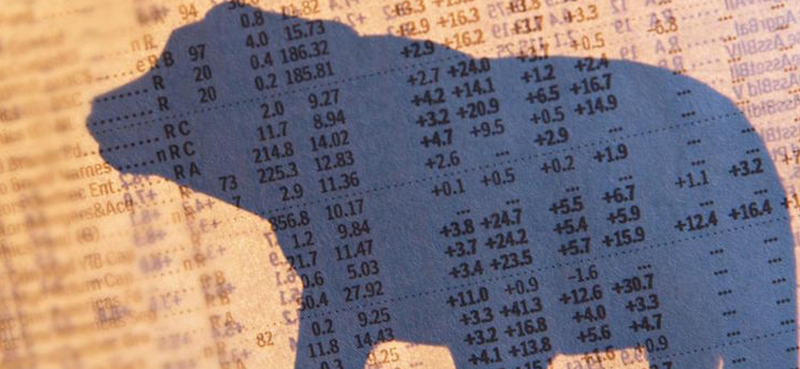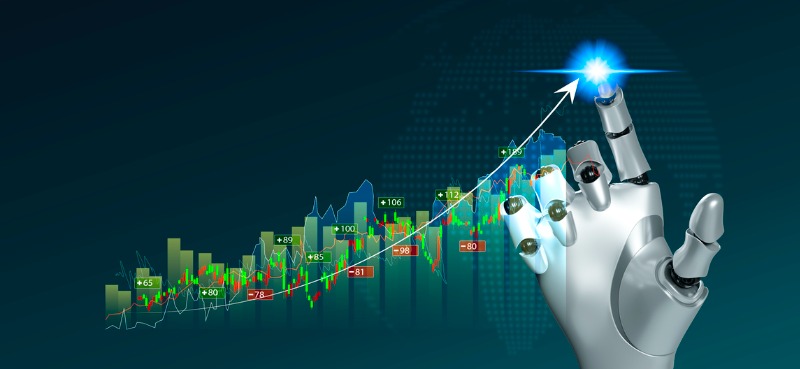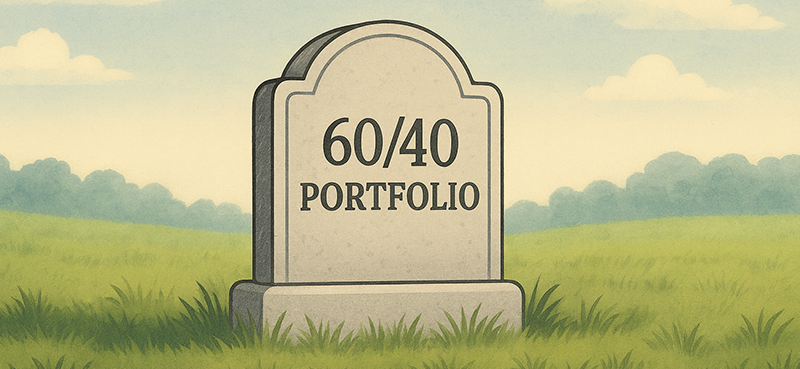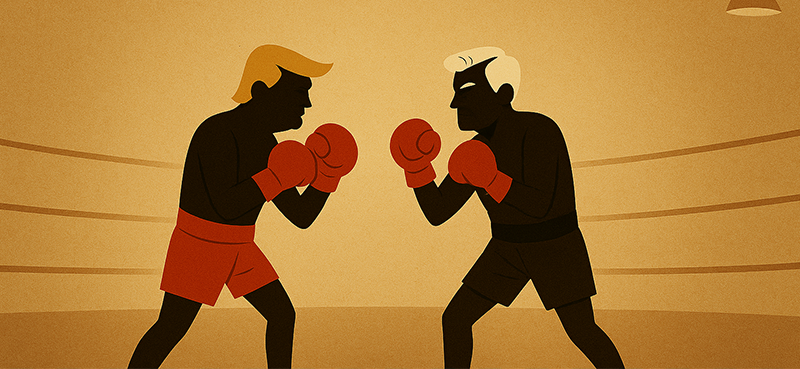Daniel Creech
Before you buy a stock in a bear market, look for this…
Markets are in wait-and-see mode ahead of today’s Federal Reserve announcement, which is expected to include a 75-point (0.75%) interest rate hike. Frank will go over the Fed’s decision on tomorrow’s podcast.
I start today’s show with some drastic advice from Jeff Gundlach, the “Bond King”… who wants the Fed to raise rates dramatically at its meeting today. I also break down some recent government policies that could have a big effect on gas prices and investment returns in the energy sector.
Plus, I share some of the characteristics of the best stocks to buy in a bear market… and a few companies that should be on every investor’s watchlist right now.
Wall Street Unplugged | 907
Before you buy a stock in a bear market, look for this…
Announcer: Wall Street Unplugged looks beyond the regular headlines heard on mainstream financial media to bring you unscripted interviews and breaking commentary direct from Wall Street right to you on main street.
Daniel Creech: How’s it going out there? It’s Wednesday, June 15th, and you are listening to the Wall Street Unplugged podcast. Once again, I, hello, Daniel Creech, senior analyst here at Curzio Research. I’m filling in behind the mic for the one and only Frank Curzio, who continues to be traveling, making deals, meeting of the minds, pitching ideas, all that good stuff. But he should be back tomorrow, behind the captain’s chair, behind the mic here. Until then, I am in charge. I can’t believe Frank continues to leave this entire company in my hands. Just kidding. Don’t panic everybody out there, especially you, Curzio One members, but we’re going to have some fun here. I’m going go over a little bit of what I talked about yesterday. Be sure and check out yesterday’s podcast, where I talked about the Fed and oil prices and things of that nature, had some fun.
Daniel Creech: Today is Wednesday, and like I mentioned, unfortunately, the Fed meeting, we’re all in Tom Petty mode here, waiting is the hardest part. The Fed will come out with its announcement around two o’clock this afternoon, markets are opening up higher this morning, leading up to that. If I had a crystal ball or had to play like I did, I would simply say the market will remain high, sell off into the news. And then depending on the rate hike, hopefully it’s 75 basis points to 1%. Then we might see a little market rally depending on, of course, the Q&A that our wonderful Fed Chair, Jerome Powell, will enlighten us with.
Daniel Creech: The Federal Reserve rate is between 75 basis points and 1% right now, give or take. And Jeffrey Gundlach, who is reserved as kind of the Bond King out of California, runs a huge bond fund. Just always enjoy listening to this guy. He does different presentations, and he’s a regular on CNBC and different financial channels. He tweeted last night that, “The Federal Reserve should raise the Fed fund’s rate to 3% tomorrow in my opinion.” That was this tweet at 10:47. I’m assuming that’s California time. So, three hours behind us here. If they raised it 3%, that would be a heck of a little pop. That would put the high end at 1.75%, and the whole notion here is… And you’ve even seen past Federal Reserve Ben Bernanke who was behind the helm of the Federal Reserve for a while. Now, Janet Yellen would get to her in just a second. Evidently, the rats are about to jump off the ship going into the midterms because she is being cut out of the inner circle of the Biden administration.
Daniel Creech: Well, we’ll get to that in the blame game here in just a second, but Gundlach is talking about… When he speaks, the market listens, and him to Federal Reserve, former chairs, Ben Bernanke and everybody right now is talking about the credibility. We need credibility from our leaders. We need credibility from the smartest guys in the room, and they really don’t have any because they are so far behind the curve. Kuppy, who’s a regular on the Wall Street Unplugged podcast… Harris Kupperman is fantastic hedge fund guy, newsletter writer, he had a great thread on how far the fed was behind. And it doesn’t really matter on a 50 basis or a 75 basis point hike because oil continues to drive and do the job of the Fed, meaning the higher price of oil and the sustained high price of oil is going to dramatically affect the consumer and the economy all over.
Daniel Creech: Now that’s one reason why you should have exposure to the oil and gas industry, because those stocks have been performing more on that in just a moment. But it’s also because you’ll see it in retail sales, you’ll see it in different economic readings because as people have to use their discretionary income, a lot more of it than in the past to just get around, that’s going to take away from something, whether it’s food, whether it’s clothing, whether it’s travel services, it’s just going to have an impact. We just have to wait, use our best judgment to see how that’s going to filter through the economy.
Daniel Creech: As I said yesterday, hopefully they come out with a 75 basis points, maybe 1% higher, but the language that they need to use is that they finally got it, because we have two choices. We’re either going to drag this out, which is probably the option we’re going to take, or they’re going to hike rates quickly and throw off this credibility issue because Fed Chair Powell is trying to steer the economy and say everything to give everybody kind of a heads up. And I’m not saying that’s good or bad. That’s the route he’s taking, but if you really want credibility, and you want to be independent, and you want to show that you’re serious, you got to pay, you got to take action. And that in this case, is rising rates, and that’s going to cause a major slowdown. It’s already cause dramatic volatility like we’ve seen last Friday, the 10th up until this week already.
Daniel Creech: Turning to, so we got the fed. We have to wait on that. And Frank can talk about that on tomorrow’s podcast, or we can at least update you with what’s going on and go from there. My point to all this is that you got to pay attention to these type of politics and policies because these dramatically affect everything in your life. Interest rates are key to the economy, and they’ve been manipulated for years. It’s a paradigm shift, where they’re starting to find a market level or a market bottom, meaning the market is dictating that interest rates, it’s going to cause everything else to re-rate. So, just to reiterate my advice here in general, is that you need to use bear market rallies to evaluate everything you have across the stocks, bonds, whatever, across the board, and either trim or decide to cut your losses or get out because of these paradigm shifts that’s going on in the markets.
Daniel Creech: Relating to energy, moving on, as I’ve talked about, you got to brace for higher oil prices, higher energy prices in general for the sustained future for a good while because the blame game continues to go on. And what a difference just a week or a couple of days makes because I pointed out how different people from our current administration to everybody else is blaming. Whether it be the Russian invasion of Ukraine, Saudi Arabia, for not pumping as much as it “should,” depending on who you are, this, that, and the other. The takeaway here is, have exposure to energy prices. Of course, if the Federal Reserve comes out and does what Jeffrey Gundlach says, raises to three or hell, let’s raise it to 5% today. If we can do whatever we want and show how tough we are… Well, let’s go ahead and bump it up. Calls the market crash, calls the pain to get over more quickly, rather than dragging it out.
Daniel Creech: Don’t bet on that, bet on dragging it out. That’s what they do best. This is from yesterday. Bloomberg reports that oil companies that record a profit margin better than 10% would face a new federal surtax under a plan developed by a key Senator. This key Senator is Senator Ron Wyden, an Oregon Democrat who chairs the tax writing finance committee, would mean the oil companies face federal taxes of as much as 42%. That’s 21% US corporate tax rate. Plus, this other 21% surtax. These sources are always wonderful. Oh, couple people briefed on the matter that aren’t allowed to talk about it yet. Wyden said he releases plan publicly. He’d likely need all 50… Let’s get to the good stuff. Here’s a quote. “The proposal I’m developing would help reverse perverse incentives to price gouge.” Let me read that again for all you listening now, pay attention.
Daniel Creech: “The proposal I’m developing would help reverse perverse incentives to price gauge by doubling the corporate tax rate on companies, excess profits, eliminating egregious buybacks and reducing accounting tricks.” Wyden said about the proposal he plans to introduce in the coming weeks, quote by contrast companies that provide relief to consumers by either reducing prices or investing in new supply would not be affected. Okay, well, this is hilarious. You can’t say reducing accounting tricks on one hand, and then have the other hand say that if you reduce prices or invest in new supply, it would not be affected because you can do that on the balance sheet with accounting tricks. Now, the reason that you should pay attention to this is, number one, it should be scary because what you have here is what is the answer to lower gas prices, well, supply and demand, what’s wrong right now.
Daniel Creech: You have a lot of demand outpacing supply, for lack of a better term, meaning rising prices. You want to reverse that you don’t tax it. You don’t limit it. You don’t do anything. You just produce more. You flip the equation. So, you increase supply. Therefore, it reaches demand. And if the Federal Reserve or any other reason as higher prices continue to cause a slowdown in an economic recession, you’ll then have higher supply and lowering demand. Meaning prices are going to fall. That is the answer. And just because I’m a 36 year old dumb kid without all the great doctrines and PhDs and what have you. I simply have a bachelor’s degree. Somehow, I went to school for well over four years. I got a bachelor’s and didn’t get my associates. That’s how serious I took school at the beginning. But that doesn’t mean that you’re not smart enough.
Daniel Creech: I don’t care if you have an eighth grade education or what. You could be a doctor and still be dumber in hell when it comes to economics. This is not rocket science. This is very simple supply and demand. And the fact that key senators, I mean, hell, this guy is on the tax writing policy or something. I mean, this guy’s got to be one of the best. They have no clue. They know, but they’re choosing not to. We’re not ruling out. Let’s see here. Then, this is hilarious. Because they call out one of my favorite stocks, which is up significantly in Dollar Stock Club. And it says last week at a port of Los Angeles on Friday, President Joe Biden specifically called out Exxon for raking in bumper earnings, quote from the president, evidently. We’re going to make sure everyone knows Exxon’s profits. Exxon made more money than God last year.
Daniel Creech: I didn’t see God’s tax return. And I don’t know if he’s a 10-99 or a W2 employee, but I’ll have to ask him when, when I pray this evening. You can’t make this stuff up. This is better than a Hollywood movie. Getting back to the senator’s quote here, the proposal I’m developing would reverse perverse incentives of price couch. Let me unpack this. Doubling the corporate tax rate on company’s excess profits. That’s a stickler there because that’s going to go through crazy amounts of wording and bill language, to have the common guide, just throw up his hands and discussed and not even have to worry about that. Eliminating egregious buybacks and reducing accounting tricks. We’ll forget the accounting tricks because a lot of those are goofy anyway. And he’s got a point there. You could reduce a lot of things very easily across corporate America, but that won’t happen anytime soon either. Egregious buybacks that shows you who they think the enemy is.
Daniel Creech: And that is, investors, that is capitalism at its core. And that is the big takeaway and the worry that you need to see through all the energy, whether it be energy or shipping or food prices or logistics or gas prices, it doesn’t matter. Internet, now 5g is a requirement or it should be a free… Internet should be free, everything. And what they do, politicians in general is pit one another against each other. Why not have investors or pay attention to rewarding everybody? I mean, instead of pointing them out as the bad guy, you should point to the wealth creation. It should be good that you point out ExxonMobil’s profits. You should start that conversation and then go from there. But this is just slinging mud because they have to. And one quick point here on energy and why the incentives… Actually, two more good ones here, and then we’ll move on.
Daniel Creech: This is from the opinion section of the Wall Street Journal on Thursday, June 9th. And it says why energy companies won’t produce. Full disclosure, this guy, Mr. Stalenberg, is a former vice president, chief financial officer for Vine Energy. So he’s biased. He’s just to give all you haters out there against oil and gas, some context, but he starts out and says, “President Biden has urged oil and natural gas companies to ramp up production. And you think given the current high prices, they would be interested in doing so, but not so fast. Oil and gas is a five year highs,” but he quotes, listen to this. “Devon Energy recently issued guidance for 2022 that refers to capital spending in the range of 1.9 to 2.2 billion and production between 570 million to 600 million barrels of oil equivalents per day. That’s across the board, whatever you produce, you equate it or you turn it into oil from a measuring standpoint.”
Daniel Creech: Now, that’s a modest increase in capital spending, but it’s a modest decrease in production. Devon also anticipates increased cash returns to shareholders for 2022. Like many in the industry, Devon obviously believes it’s better to return capital to its shareholders than reinvest in the business. Now, why would that be if prices in an all-time high, why wouldn’t they go drill more? Is it because they hate the consumer? Their very customers who they serve. Is it because they love their shareholders? Also fiduciary responsibility to treat them well. Or, is it because they’re the bad guy and they’re the blame team for everything? Well, we’re onto something here, skip down another paragraph. And it points out that says last September 20, House Democrats introduced the Fossil Free Finance Act, which would require the Federal Reserve bank to take steps, to stop banks from investing in fossil fuel production. The bill’s goal, “No financing or new or expanded fossil fuel projects after 2022.”
Daniel Creech: Well, that’s this year, people, six months left. Now, why is that important? Well, because eventually you need people actually with a brain, almost didn’t make this a family-friendly show there. Frank can use the F-bomb, not his assistant Daniel, because you need some people with a brain to fight back, and look at West Virginia leading the charge. This is hilarious. West Virginia evidently sent a letter to a handful of banks, including Goldman Sachs. Our favorite banks here at Curzio Research because they are one of the most tongue-in-cheek, fun, smiling, crooked people that always seem to make money. They call out, West Virginia calls out these banks, and even BlackRock’s CEO, biggest asset manager, Larry Fink, pointing to the fact that he has been outspoken and pressuring corporate leaders to commit to investment goals that will undermine reliable energy sources like coal, natural gas, and oil under the guise of helping the planet.
Daniel Creech: Now these are officials out of West Virginia, and this is good because you need the argument to take center stage. And there’s nothing like that to bring the argument to center stage, then record high gas prices, huge high oil prices and energy prices. And the fact that there’s no end in sight because the governing policies think it’s better for you and I to suffer for the sake of the health of the planet than it is to pay lower prices and be more independent, more free, and be able to have more choices in our economy. Now of that tangent, we’re running out of time. I got to keep these under 30 minutes or your next podcast is free. I want to say one quick thing on operating companies and bear markets and how to view them. I’m going to just think out loud here and kind of talk through this.
Daniel Creech: The front page of the Wall Street Journal today, points out that Coinbase is cutting its staff by 18%, or about 1100 people, as they brace for a recession in the general economy and the overall… Maybe another crypto winter. That was the two-year period roughly where crypto tanked, when it first hit 20,000 a coin and then fell all the way back below 4,000. Recently, it’s hit high of almost 70,000, it’s dropped over 65%. It’s give or take 20,000 now. Hopefully, it doesn’t go back all the way to the 80% retracement like it has in the past. That would take it from its previous high, all the way down to around 12,000, if my math is correct, which you can all double check me and give me fun, fair, or hate messages, smile, daniel@curzioresearch.com. That’s daniel@curzioresearch.com.
Daniel Creech: Because we are going into this new environment of higher inflation, higher interest rates, and growth isn’t going to be rewarded like it has been in the last 10 years. Now, you really want to focus. And I don’t mean to bore you to death, but I can’t stress this enough on how to think through this because I’ve been talking with a lot of contacts, friends, family, investors, and you want to really for the first time, and long time management and operating fundamentals matter. It’s not just about growing anymore. And I talked a lot about this yesterday, so I don’t want to continue to repeat myself, but I’m just going to give you a handful. I’m not saying by these blindly, I’m seeing, I’m talking about this from a thinking through process on the investor side. So, you take Target and Walmart, huge distributors, wonderful well-run companies, been in business a long time, have a great track record.
Daniel Creech: Target’s down, give or take, 40% year-to-date, or close to that. Walmart’s done not that much, but hasn’t seen the run up like Target has. In the past few quarters, they’ve talked about shifting consumer behavior. Target recently came out and lowered first, lowered a little bit of revenue, but then backed it up in the second half and causing the stocks to really sell off hard. And I get that because it’s all knee jerk reaction. And when you have knee jerk reactions because of the leverage, because of the money sloshing around, and yes, the Federal Reserve has changed course recently, but there’s still, it takes a long time to flow through the pipeline.
Daniel Creech: It takes a long time for this spill to make its way down river. And that’s what we’re going to experience. So, you have to be prepared for this, this new normal, these bear markets, the road less traveled is lower across market indices as we re-rate everything and get used to this high inflation, higher interest rate environment. Target, and Walmart, and previous quarters have talked about how they’re going to pass on some of the prices with transportation, energy inflation, et cetera, to the consumers.
Daniel Creech: But they’re also going to eat some of those prices because they’re in it for the long-term. These guys are like insurance companies. They’re looking way down the road. They want to have because consumers and know that they’re going to have consumers for years and years to come. And why is that a good thing as an investor? Well, because holding these companies gives you not only upside capital appreciation, I.E, higher stock prices, but it’s also going to let you compound your money in a very good way with the dividend, possible share buybacks. There’s opportunity for special buyback or special dividends, excuse me, because of the amount of cash flow coming in. So, you want to focus. You want to look at these, A, the company presentations and things like that. FedEx just hiked its dividend. In Target, for its point, real quick, Target upped its dividend recently like 20%. FedEx came out and acted like they didn’t really want to show Target anything.
Daniel Creech: They increased their dividend 53%. So, newer CEO there, I’m not even going to try to butcher his name, announced that board of directors declared a quarterly debt cash dividend of a dollar 15 per share that represents 40 cents per share or a 53% increase from its previous dividend. They also, this is another key thing to look for. So, you’re looking at management, you’re looking at operating companies. Another great thing is that look for newer CEOs. Now, whenever you get a new CEO, the first couple quarters, they might use that as a, “throw everything out” moment. And why wouldn’t you? If you’re taking over the realm, you want to lower expectations and then start, whether that be a basketball team, a football team, whatever. Cut right to the bone in the beginning, and then lower expectations when things are going up.
Daniel Creech: So, look for newer management teams, look for operating teams. FedEx, one of the founders just changed to chairman of the board. I believe so there’s a lot of new places going on. So, that might be rocky, but that kind of move to say, “Hey, we’re serious about this. We’re going to realign management compensation with shareholder returns and CapEx spending, as such, and we’re increasing this dividend,” that shows you that they have good nature in the game. You want to continue? Look for that. Another stock here, Camping World Holdings. I talked about this a couple weeks ago when I filled in for Frank Curzio on The Dollar Stock Club. Dollar Stock Club, quickly, is our cheapest newsletter. Marketing should hang me. I don’t even know what it costs. It’s very cheap. It’s a couple bucks a month, I think. We give out a lot of ideas.
Daniel Creech: It’s just an idea generation off of either Frank and I’s conversations or his guest. And if you subscribe to any of our products, you get Frankly Speaking, which only goes out to paying subscribers. I filled in for Frank a couple of weeks ago, and really talked about Marcus Lemonis, the CEO of CWH, and he has huge ownership in the company. And he just bought… Just this week, I believe it was dated the 10th. So, maybe last week, and they filed this week. He just bought another million dollars in stock. Now he’s a rich guy. So, take that with a grain of salt. But when stocks are tanking, markets are pulling back. You want to see those kind of CEOs, those management teams, step up. You want to see them communicate. You want to see them take action. And that’s what they’re doing. Another great operating company that I’ve talked about in the past is AutoZone, AZO.
Daniel Creech: Pull up a transcript from their conference call. Their management teams, have a great pulse on the market. They serve the customer well. They have a great business model, and they continue to buy back shares on a regular basis as part of their business plan to drive up earnings and the stock price. And it’s working. I know it’s pulled back from previous highs, but it’s a $2,000 stock give or take for a reason. And it’s an amazing operating company. One other company that I will… And then also look for this, just caught my eye because I’m having some fun with this, I’ll revisit this, but one company, this reminded me of this just on the fly. I wasn’t going to talk about this, but I’ll cram it in here quickly. I saw that Cheniere Energy, LNG, has entered into an agreement to buy 350 million worth of stock back from Carl Icahn. Carl Icahn is one of my favorite hedge fund managers. There’s YouTube videos of him having hilarious standup stories about previous deals. Search that on the internet for a good laugh.
Daniel Creech: LNG Cheniere Energy has a billion dollar. I’m going off memory here, a billion dollars in their share buyback under authorization right now, so they’re using 350 million from Carl Icahn. The other thing that has me perplexed, I’ve been following this stock for a little bit of Xerox, XRX. Now at first glance, it’s going to be a dying business. You have to balance between hybrid work from home and corporate offices and printers and all that kind of stuff. And there’s a lot of competition, and it’s just, it’s a dying business. And Xerox is selling off non-profitable divisions and recouping it and things. But when you read their transcripts, they’re basically saying, “Hey, we’re just a cash flow business.” And this is what I think, Carl Icahn sees it. I brought this up because he’s a huge shareholder, something like 20, 30% of the stock.
Daniel Creech: And you want to think about just in terms, like I mentioned yesterday, Harold Hamm, large owner of Continental Resources made an offer to take that private. I don’t know if Carl Icahn is thinking the same thing or if other funds are, but on the conference calls, management’s saying, “Hey, we’re going to do at least 400 to 475 million free cash flow or operating cash flow.” They’re going to pay 50% of free cash flow back to shareholders either through dividends and share repurchases. So effect, again, you have a management company focused on operating for the shareholders, and that’s what you want to think about. Xerox has gotten tanked, and Icahn has recently been buying. I’ll continue to follow that. Maybe that’ll make its way in. Give me your feedback. Tell me what he sees that I don’t see jumping out at me.
Daniel Creech: I’d be greatly appreciate it, daniel@curzioresearch.com. But in bear markets, you want to focus on those traits and don’t panic. Just think through that. You’re going to see a lot of volatility, and that’s okay because you got to remember lower prices create opportunity. And unless the world ends, you’re always going to have more opportunities. So, you don’t have to be buying stocks today, but have cash available. Be trimming stocks, be selling stocks that either your thesis has changed or you were just flat out wrong. It happens, and just hold cash to where you’re ready when the opportunity strikes. Bear markets are where a lot of people make their money because when all prices come down, those that don’t panic, those that don’t give up and have opportunity and have cash available, can buy great stocks or great businesses at wonderful prices and let them compound for time. And when I say time, I mean a few years, at least, or more.
Daniel Creech: It’s not a, “Hey, look at this. I’m going to buy this on Monday, in a month from now, it’s going to be up 50%.” You need to re-rate your expectations on that because we have a fundamentally different market now with rising interest rates and higher inflation. All right, I’ll get off my soapbox here. I might have taken a little longer than 30 minutes. I’m going to get yelled at, but anyway, send me your feedback, good or bad, daniel@curzioresearch.com. Even if I don’t reply, I do read them all. I greatly appreciate it. Some, I can’t. I have to walk a tight rope between financial advice and all that, because we’re generally here just to help you, communicate with you, and I hope you all have a great day. It’s been great filling in, and we’ll get back to our regular programming tomorrow. Cheers.
Announcer: Wall Street Unplugged is produced by Curzio Research, one of the most respected financial media companies in the industry. The information presented on Wall Street Unplugged is the opinion of its host and guests. You should not base your investment decision solely on this broadcast. Remember, it’s your money and your responsibility.
Editor’s note:
The Dollar Stock Club is filled with the very best ideas from Frank’s vast and powerful network—carefully curated assets across a variety of sectors…
From inflation-ready assets like uranium and energy… to the world’s most exciting investment trends, like security tokens and ESG.
And at just $4, this service is a “no-brainer” in any market.























